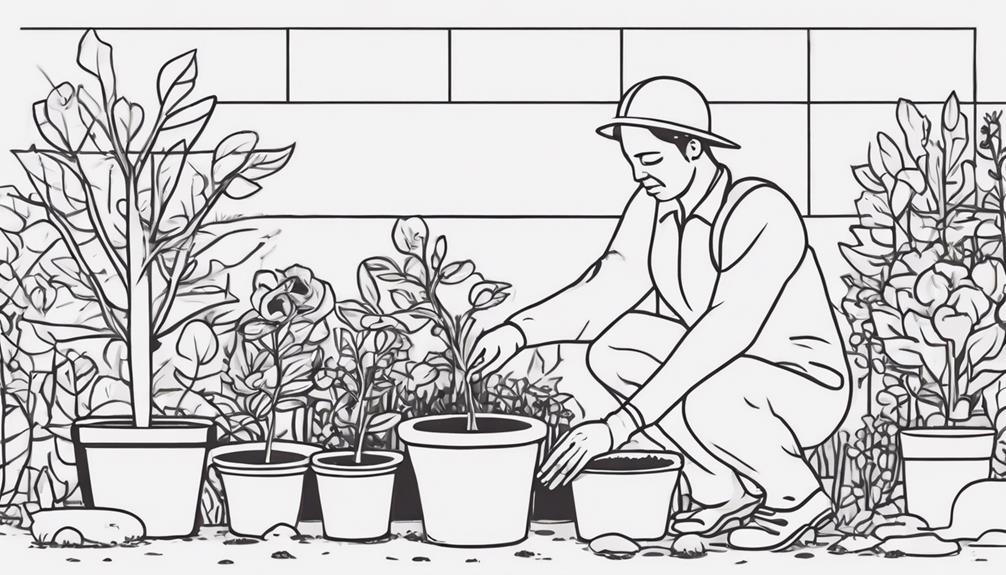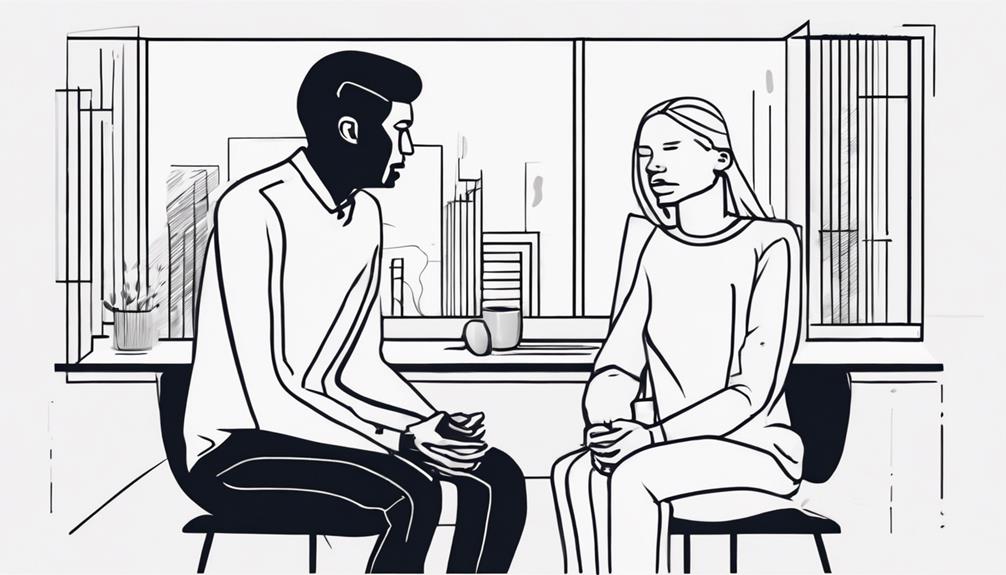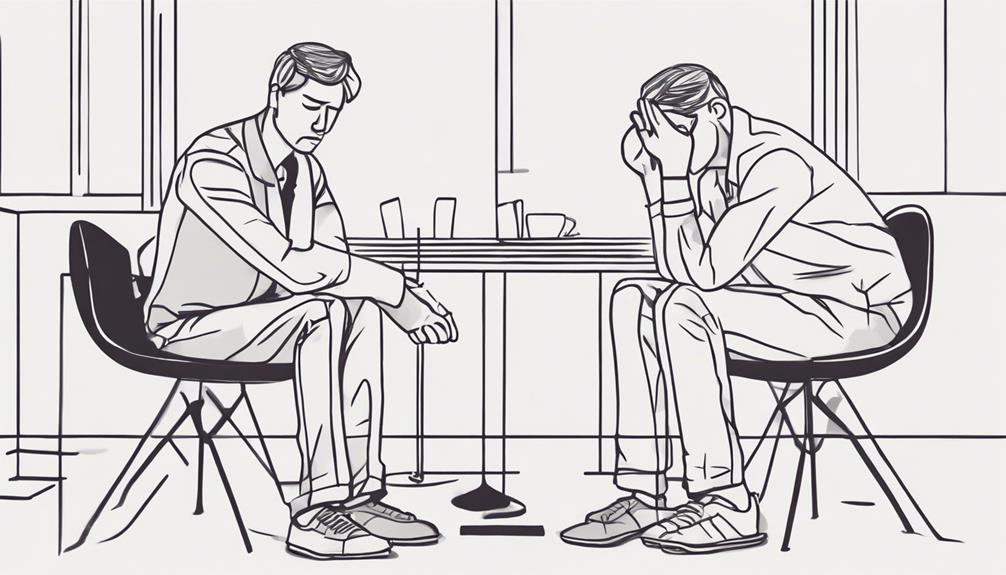In the intricate dynamics of relationships, the virtue of patience emerges as a fundamental pillar that upholds the structure of emotional bonds and nurtures the growth of understanding between partners. Patience, often overlooked in its significance, serves as a catalyst for fostering resilience in facing adversities and complexities that arise in shared lives. Its role extends beyond mere tolerance, delving into the realm of profound emotional intelligence and fortitude. By unraveling the layers of why patience is crucial in relationships, we open the gateway to a deeper exploration of its transformative power in shaping the very fabric of human connections.
Key Takeaways
- Patience in relationships fosters mutual understanding and healthy communication.
- Impatience strains bonds, leads to conflicts, and erodes trust and intimacy.
- Communication breakdowns result from impatience, hindering deep emotional connections.
- Practicing patience enhances emotional connection, trust, and overall relationship satisfaction.
Understanding the Role of Patience

Understanding the role of patience in relationships is crucial for promoting mutual understanding and fostering healthy communication dynamics between partners. Patience, defined as the ability to endure waiting or delays without becoming annoyed or upset, plays a fundamental role in building a strong foundation for relationships. By allowing time for thoughts to form and emotions to settle before responding, partners can engage in more thoughtful and considerate communication. This time factor is essential as it prevents impulsive reactions and gives space for constructive dialogue. Patience with a partner demonstrates respect for their perspective and feelings, nurturing a sense of trust within the relationship. It also cultivates empathy and compassion towards the partner, leading to deeper emotional connections. In essence, patience acts as a cornerstone for healthy relationships by providing the necessary time and space for understanding, effective communication, and the development of a strong bond between partners.
Impact of Impatience on Relationships
Impatience in relationships can strain the bond between partners, leading to breakdowns in communication and understanding. It fosters an environment where conflicts arise easily, eroding trust and intimacy. Rushed decisions driven by impatience can have detrimental effects on the overall health and longevity of the relationship.
Relationship Strain From Impatience
In relationships, the detrimental effects of impatience manifest through heightened conflicts and barriers to effective communication. Impatience can lead to relationship issues such as increased arguments, misunderstandings, and a lack of understanding of your partner's perspective. This lack of patience can weaken the bond and intimacy between partners, as hasty decisions driven by impatience may cause unnecessary heartache. Developing patience is crucial in navigating these challenges, as it can boost confidence and resilience in handling relationship difficulties. By cultivating patience in a relationship, individuals can enhance their ability to communicate effectively, empathize with their partner, and build a stronger, more harmonious connection.
Communication Breakdowns Due to Impatience
The breakdown of communication in relationships can often be attributed to the detrimental effects of impatience, leading to misunderstandings and conflicts that hinder effective interaction. Impatience manifests in various ways, including rushed responses, which can distort the intended message and escalate tensions. This hurried communication style diminishes the quality of dialogue and prevents thorough understanding. Additionally, impatience contributes to emotional distancing between individuals, creating barriers to open and honest discussions. Over time, these communication breakdowns can erode trust and intimacy within relationships. Addressing impatience is essential to fostering clear, respectful communication and nurturing strong emotional connections.
Practicing Patience Daily

Consistent practice of patience on a daily basis is paramount for fostering effective communication and understanding within relationships. By actively engaging in the practice of patience, individuals can navigate challenges such as miscommunication and disagreements more effectively. Through active listening and thoughtful responses, patience allows partners to strengthen their relationship by demonstrating respect and building trust on a daily basis.
Moreover, choosing patience over impulsivity during emotional moments in daily interactions can prevent hasty decisions that may lead to further discord. The cultivation of patience on a daily basis not only benefits the relationship dynamics but also contributes to the overall well-being of individuals involved. It plays a crucial role in reducing stress levels within relationships, creating a more harmonious environment where communication flows more smoothly. Therefore, incorporating the practice of patience into daily interactions is a foundational element in establishing and maintaining healthy, fulfilling relationships.
Developing Patience Skills Together
Collaboratively developing patience skills as a couple enhances mutual understanding and strengthens the foundation of the relationship. Cultivating patience together not only benefits the individuals but also the relationship as a whole. Here are some key points to consider when focusing on developing patience skills together:
- Strengthens Bond: Working on patience as a team fosters a deeper connection between partners, creating a stronger bond built on trust and empathy.
- Teamwork and Collaboration: It encourages a sense of teamwork and collaboration, where both partners support each other in navigating through challenges with patience and understanding.
- Enhanced Communication: Developing patience skills together leads to improved communication. Patience allows for active listening and better expression of thoughts and feelings.
- Supportive Environment: Practicing patience as a couple creates a supportive and nurturing environment where both partners feel valued and respected, contributing to a harmonious relationship.
Communication for Patience Building

Transitioning from the collaborative development of patience skills, effective communication serves as a cornerstone for cultivating patience in relationships. Communication plays a pivotal role in fostering patience by enabling partners to express their thoughts, feelings, and needs openly and honestly. Active listening, a key component of effective communication, involves fully concentrating on what the other person is saying without interruption or judgment. By actively listening to each other, individuals can better understand their partner's perspective, leading to increased empathy and patience in the relationship.
Moreover, conflicts are inevitable in any relationship, but how they are managed can significantly impact the level of patience between partners. Constructive communication during conflicts, where both individuals express their concerns calmly and respectfully, can prevent misunderstandings and facilitate resolution. Utilizing "I" statements to express feelings and needs can help avoid blame and defensiveness, promoting a more patient and understanding atmosphere. By working together to navigate conflicts and disagreements through effective communication, partners can strengthen their bond and cultivate patience in their relationship.
Empathy and Patience Connection
The relationship between empathy and patience is a fundamental aspect that significantly influences the emotional connection and understanding between partners. Empathy in relationships involves the ability to understand and connect with your partner's emotions and feelings, while patience allows you to navigate and respond to these emotions in a supportive manner. Together, empathy and patience create a strong foundation for a deep emotional connection, fostering trust, communication, and intimacy within the relationship.
- Empathy is the key to understanding your partner's experiences and perspectives.
- Patience enables you to respond to your partner's emotions with support and understanding.
- The combination of empathy and patience strengthens the emotional bond between partners.
- This supportive and understanding environment values both partners' feelings and perspectives, leading to a healthier and more fulfilling relationship.
Signs That Patience Is Insufficient

Insufficient patience in a relationship can manifest through warning signs such as heightened irritability, impulsive reactions, and a lack of tolerance for differences in opinion. These signs can disrupt the natural flow of communication and hinder the ability to resolve conflicts effectively. Recognizing these indicators is crucial to addressing underlying issues before they escalate and damage the relationship further.
Warning Signs of Impatience
Recognizing warning signs of impatience in a relationship is crucial for fostering understanding and harmony between partners. Impatience can manifest in various ways, indicating that patience is insufficient for a healthy relationship:
- Frequent Arguments: Impatience often leads to frequent arguments and misunderstandings.
- Rushed Decisions: Lack of patience can result in rushed decisions that harm the relationship.
- Feeling Undervalued: Impatience may cause partners to feel undervalued and criticized.
- Emotional Distancing: It can lead to emotional distancing and resentment between partners.
Being aware of these warning signs can help partners address impatience and work towards building a stronger, more resilient relationship based on patience and understanding.
Impact on Relationship Dynamics
Impatience in relationship dynamics can significantly disrupt communication and understanding between partners, leading to detrimental consequences. Insufficient patience may manifest as frequent misunderstandings, impulsive reactions, and decisions that harm the relationship. This pattern of impatience can create tension and distance, hindering the ability to listen and comprehend your partner's perspective. Constant frustration and irritability often signal a lack of patience in relationship dynamics. To counter these negative effects, cultivating patience is crucial. Practicing patience allows for improved communication, deeper understanding, and better conflict resolution. By recognizing the importance of patience in relationships and actively working to develop this trait, partners can foster a healthier and more harmonious connection.
Seeking Help When Needed
When facing challenges in a relationship, one effective approach is to seek professional assistance to enhance patience levels and foster deeper connections between partners. Seeking help when needed can significantly benefit relationships in various ways:
- Counseling Support: Counseling sessions can provide valuable tools and insights to improve patience levels in relationships.
- Trained Therapists: Trained therapists can assist in building tolerance and promoting closeness between partners through targeted interventions.
- Appreciation for Virtues: Seeking help demonstrates an appreciation for the virtues of your partner, showing a willingness to work on the relationship.
- Effort and Attention: Building strong relationships requires consistent effort and attention, and seeking support is a proactive step towards nurturing the relationship.
Long-Term Benefits of Patience

In the realm of intimate relationships, the cultivation of patience yields enduring benefits that lay the foundation for enhanced emotional connection and mutual understanding between partners. Patience serves as a fundamental pillar in fostering a healthy and harmonious relationship. It allows individuals to navigate challenges, conflicts, and disagreements with a calm and composed demeanor, leading to constructive resolutions and a stronger bond over time. By being patient, partners demonstrate their willingness to listen, understand, and support each other, fostering trust, respect, and intimacy within the relationship. Moreover, patience prevents impulsive reactions and decisions, creating space for thoughtful communication and problem-solving processes. This, in turn, contributes to overall relationship satisfaction and reduces stress levels for both individuals involved. In essence, the practice of patience in a relationship paves the way for deeper emotional connections, effective conflict resolution, and a more fulfilling and enduring partnership.
Cultivating Patience for Stronger Bonds
Cultivating patience in relationships plays a crucial role in building trust, as it allows partners to demonstrate reliability and consistency over time. Additionally, patience enhances communication skills by encouraging active listening, understanding, and thoughtful responses in discussions or disagreements. Furthermore, fostering emotional connection through patience creates a safe and supportive environment where partners can express vulnerability and deepen their bond.
Building Trust Through Patience
How does the practice of patience contribute to the establishment of trust within relationships and the development of stronger emotional bonds with your partner? Building trust through patience involves consistent displays of commitment and understanding over time. Here are key points to consider:
- Demonstrating Commitment: Patience showcases your dedication to the relationship's growth and your partner's well-being.
- Fostering Understanding: Patience allows space for empathy, active listening, and support, enhancing mutual understanding.
- Deepening Trust: Trust is strengthened as patience and respect become integral parts of the relationship dynamic.
- Navigating Challenges: Patience provides the necessary foundation to address conflicts constructively, promoting a healthier relationship environment.
Enhancing Communication Skills
Enhancing communication skills through the cultivation of patience is foundational for establishing stronger emotional bonds and fostering mutual understanding in relationships. Patience plays a crucial role in promoting active listening, where individuals attentively engage with their partners and seek to understand their perspectives. This practice enhances empathy and compassion, leading to deeper connections. Additionally, developing patience allows for more effective conflict resolution by creating a space for respectful and open communication. By honing patience, individuals can navigate disagreements with a calm and understanding demeanor, promoting a supportive environment for honest dialogues. Ultimately, building patience in relationships not only strengthens trust and intimacy but also contributes to overall relationship satisfaction through improved communication and conflict management.
Fostering Emotional Connection
Building a strong emotional connection in relationships necessitates the cultivation of patience as a fundamental component for fostering deeper bonds between partners. Patience plays a crucial role in enhancing emotional connection by allowing individuals to truly understand and empathize with their partners. This understanding leads to effective communication, enabling both parties to express their thoughts and feelings openly. Additionally, patience in relationships promotes conflict resolution, as partners can approach disagreements with a calm and composed demeanor, fostering a sense of trust and respect. Ultimately, demonstrating patience in a relationship showcases dedication and commitment to nurturing a strong and lasting emotional connection.
Reflecting on Relationship Patience
Reflecting on the role of patience in relationships reveals its fundamental contribution to fostering understanding and strengthening the bond between partners. Genuine interest, demonstrated through patience, allows individuals to invest time and effort into comprehending their partner's thoughts, feelings, and perspectives. This investment in understanding lays the foundation for a fulfilling relationship built on mutual respect and empathy.
By exercising patience, partners create a safe space where challenges such as miscommunication and disagreements can be navigated effectively. Patience not only shows respect but also plays a significant role in building trust within the relationship. It prevents impulsive reactions during emotionally charged moments, leading to more thoughtful and healthier outcomes.
Furthermore, cultivating patience contributes to overall well-being by reducing stress in relationships. It enables individuals to approach situations with a calmer demeanor, enhancing problem-solving abilities and promoting a harmonious connection with their partner. In essence, reflecting on relationship patience underscores its profound impact on nurturing a strong and enduring bond between partners.
Frequently Asked Questions
Why Patience Is the Key in Love?
Patience is crucial in love due to its role in trust building, emotional support, and communication skills. It allows partners to navigate challenges with empathy and understanding, fostering a deeper connection. Demonstrating patience showcases respect for one another's virtues and strengths, enhancing intimacy. Impatience can hinder effective communication, leading to misunderstandings. Overall, patience in love is key to nurturing a strong, healthy relationship built on mutual respect and understanding.
What Is the Value of Patience in Love?
In the realm of love, patience plays a crucial role in fostering trust building, enhancing emotional connections, and facilitating effective conflict resolution. Patience allows partners to navigate challenges with empathy and understanding, ultimately leading to deeper bonds and healthier relationship dynamics. By practicing patience in love, individuals can cultivate a foundation of mutual respect and communication that is essential for long-lasting and fulfilling relationships.
How Do You Show Patience in a Relationship?
In relationships, showing patience involves honing communication skills to convey thoughts effectively while understanding the needs of your partner. Managing expectations by setting realistic boundaries and goals aids in fostering patience. By actively listening, showing empathy, and practicing self-awareness, individuals can navigate challenges calmly, promoting a harmonious relationship dynamic. Prioritizing understanding, emotional regulation, and clear communication forms the foundation for demonstrating patience in relationships.
What Does Patience Have to Do With Love?
Patience in love is akin to a gentle stream that nurtures the roots of a flourishing relationship. It intertwines with communication skills, fostering understanding and empathy. Emotional intelligence blooms as patience allows space for vulnerability and growth. Trust-building becomes a cornerstone, as partners navigate challenges with grace. In essence, patience in love serves as the bedrock for a strong foundation, enabling partners to weather storms and cherish moments of joy in unison.
Conclusion
In conclusion, patience serves as a crucial foundation for successful relationships, fostering understanding, respect, and effective communication between partners. Just as a sturdy bridge withstands tumultuous waters, patience allows couples to navigate challenges with grace and fortitude, building a stronger connection over time. By practicing patience daily, developing skills together, and seeking help when needed, couples can cultivate a lasting and fulfilling bond that withstands the test of time.
